|
|
|
Sort Order |
|
|
|
Items / Page
|
|
|
|
|
|
|
| Srl | Item |
| 1 |
ID:
068568


|
|
|
| 2 |
ID:
039837
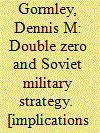

|
|
|
|
|
| Publication |
London, Tri-Service Press, 1988.
|
| Description |
xlix, 229p.
|
| Standard Number |
185488025X
|
|
|
|
|
|
|
|
|
|
|
|
Copies: C:1/I:0,R:0,Q:0
Circulation
| Accession# | Call# | Current Location | Status | Policy | Location |
| 032857 | 355.033547/GOR 032857 | Main | On Shelf | General | |
|
|
|
|
| 3 |
ID:
021612


|
|
|
|
|
| Publication |
2002.
|
| Description |
19-36
|
| Summary/Abstract |
At a time when Americans feel more vulnerable than ever before, it is appropriate that a programme for the development of national missile defence moves forward. That programme, however, should fit within a broader strategic reckoning of America's new threat environment. The lessons of 11 September ought to guide the Bush administration's decision-making as it grapples with an expensive array of new and traditional security requirements. Critical to such decision-making are intelligence estimates on the ballistic-missile threat to the United States. Yet, 11 September is seen by many as a catastrophic ‘intelligence failure’. In fact, it was more a failure of ‘strategic imagination’ than of intelligence per se. As policymakers look to the future, they should take care not to mistake the most familiar threats – such as ballistic missiles – for the most likely ones. Likewise, in pursuing military-hardware solutions, they should not discount the importance of multilateral arms control.
|
|
|
|
|
|
|
|
|
|
|
|
|
|
|
|
| 4 |
ID:
143831
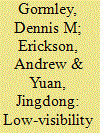

|
|
|
|
|
| Edition |
Alphaq Editions
|
| Publication |
Washington, DC, National Defense University Press, 2014.
|
| Description |
xx, 165p.: ill.hbk
|
| Standard Number |
9789385505539
|
|
|
|
|
|
|
|
|
|
|
|
Copies: C:1/I:0,R:0,Q:0
Circulation
| Accession# | Call# | Current Location | Status | Policy | Location |
| 058475 | 358.170951/GOR 058475 | Main | On Shelf | General | |
|
|
|
|
| 5 |
ID:
083319
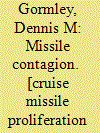

|
|
|
|
|
| Publication |
Westport, Praeger Security International, 2008.
|
| Description |
xiv, 253p.
|
| Standard Number |
9780275998363
|
|
|
|
|
|
|
|
|
|
|
|
Copies: C:1/I:0,R:0,Q:0
Circulation
| Accession# | Call# | Current Location | Status | Policy | Location |
| 053866 | 358.17/GOR 053866 | Main | On Shelf | General | |
|
|
|
|
| 6 |
ID:
056916
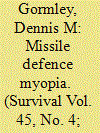

|
|
|
|
|
| Publication |
2003.
|
| Description |
p61-86
|
|
|
|
|
|
|
|
|
|
|
|
|
|
|
|
| 7 |
ID:
072908
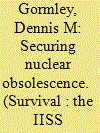

|
|
|
|
|
| Publication |
2006.
|
| Summary/Abstract |
Except as a weapon of last resort, nuclear weapons have no legitimate or compelling military role to play in any conceivable US national security challenge. Yet some policymakers still cling to modernised nuclear weapons for specific tasks in ensuring American security. Since at least 1991, US security has depended almost exclusively on increasingly capable conventional weapons, as effective as nuclear weapons for attacking the most difficult targets. Deterrence through conventional weapons is decisively more credible than through existing or prospective nuclear alternatives. The mere possession of unprecedented conventional military superiority is not enough; a truly effective strategy hinges on perceived effectiveness. Along with addressing conventional needs, America must reformulate its position on nuclear weapons to severely diminish their relevance and solidify the longstanding international taboo against their use.
|
|
|
|
|
|
|
|
|
|
|
|
|
|
|
|
| 8 |
ID:
077790


|
|
|
|
|
| Publication |
2007.
|
| Summary/Abstract |
The stage may be set for what could be a historic turning point in America's reliance on nuclear weapons to meet its fundamental national security interests. Proponents of a refurbished nuclear stockpile and infrastructure are convinced that nuclear weapons will remain central to U.S. security interests, yet they admit that there is no national consensus on the need for and role of nuclear weapons. Nuclear opponents are gravely concerned that to the extent nuclear refurbishment creates a global perception that nuclear weapons remain essential instruments, it will eviscerate nuclear nonproliferation measures precisely at a time when nuclear ambitions are growing. Moreover, opponents see deterrence through advanced conventional weapons as decisively more credible than any nuclear alternative. With hopes of elevating discourse to the national level, this article examines the key current arguments pro and con within the specialist community and forecasts changes in the U.S. nuclear arsenal over the next decade. It concludes with a brief prognosis on prospects for complete nuclear disarmament.
|
|
|
|
|
|
|
|
|
|
|
|
|
|
|
|
| 9 |
ID:
143300
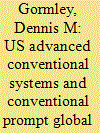

|
|
|
|
|
| Summary/Abstract |
The dangers and risks of employing a Conventional Prompt Global Strike (CPGS) capability greatly exceed the benefits. More suitable, if less prompt, alternatives exist to deal with fleeting targets. Even a niche CPGS capability—consisting of approximately twenty systems—carries risks, to say nothing of proposals to develop hundreds or more. Most dangerously, CPGS could stir the pre-emption pot, particularly vis-à-vis states that correctly perceive to be within the gunsights of US CPGS weapons; other states, too, may feel emboldened to emulate this US precedent and undertake their own form of prompt, long-range strike capability. Compressed circumstances surrounding such a scenario could foster unwanted erratic behavior, including the misperception that the threatening missile carries a nuclear weapon. But the true Achilles's heel of the CPGS concept is the unprecedented demands it places on the intelligence community to provide decision makers with “exquisite” intelligence within an hour timeframe. Such compressed conditions leave decision makers with virtually no time to appraise the direct—and potentially unintended—consequences of their actions.
|
|
|
|
|
|
|
|
|
|
|
|
|
|
|
|
| 10 |
ID:
092226


|
|
|
|
|
| Publication |
2009.
|
| Summary/Abstract |
Because Europe and the U.S. forces based there face a near-term ballistic missile threat, President Barack Obama's decision to abandon a Bush-era missile defense plan makes good sense. In contrast to President George W. Bush's approach, which focused primarily on a few potential ICBMs, Obama's is more suited to Iran's growing arsenal of medium- and intermediate-range ballistic missiles.
|
|
|
|
|
|
|
|
|
|
|
|
|
|
|
|
|
|
|
|
|